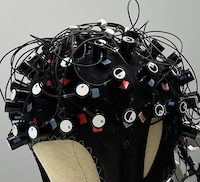Abstract
Functional near-infrared spectroscopy (fNIRS) is an optical imaging technique for assessing human brain activity by noninvasively measuring the fluctuation of cerebral oxygenated- and deoxygenated-hemoglobin concentrations associated with neuronal activity. Owing to its superior mobility, low cost, and good tolerance for motion, the past few decades have witnessed a rapid increase in the research and clinical use of fNIRS in a variety of psychiatric disorders. In this perspective article, we first briefly summarize the state-of-the-art concerning fNIRS research in psychiatry. In particular, we highlight the diverse applications of fNIRS in psychiatric research, the advanced development of fNIRS instruments, and novel fNIRS study designs for exploring brain activity associated with psychiatric disorders. We then discuss some of the open challenges and share our perspectives on the future of fNIRS in psychiatric research and clinical practice. We conclude that fNIRS holds promise for becoming a useful tool in clinical psychiatric settings with respect to developing closed-loop systems and improving individualized treatments and diagnostics.
